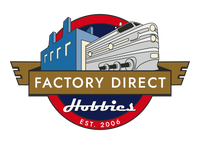PROTOTYPE SPECIFIC INFORMATION
In By the early 1960’s the Electro-Motive Division (EMD) was at a big disadvantage. Their 567 engine, in use for over 20 years, had reached it’s peak at 2,500 horsepower in a turbocharged 16-cylinder version. EMD released a new 645 engine in 1966. The most powerful locomotive using this series of engine was the SD45, powered by a 20-cylinder turbocharged 645E engine producing 3600 horsepower. EMD then offered the V20 645E engine in the SDP45 in a standard hood configuration and longer frame to occomodate the steam generator needed for passenger service. The EMD SDP45 was a good passenger locomotive, but to the Santa Fe Railway it did not look the part. EMD therefore designed a lightweight “cowl” body to cover the locomotive, though it did not, as in earlier cab units, provide any structural strength, which remained in the frame. The cowl provided sleeker looks, better aerodynamics at speed, and allowed the crew to enter the engine compartment en route for diagnostics and maintenance. After sponsoring the development of the FP45 passenger locomotive, the Santa Fe requested a similar freight locomotive from Electro-Motive. Where the FP45 was an SDP45 wrapped in a full-width Cowl carbody, the new F45 was essentially an SD45 given the same treatment.
The year of 1989 saw the re-birth of Santa Fe’s iconic red and sliver “warbonnet” scheme originally introduced in the mid 1930’s. This modernized version with large lettering became the standard for all wide cab Santa Fe diesel locomotives purchased from 1990 until the BNSF “heritage” scheme introduced after the merger. Keeping the tradition of the great passenger trains back in the day, Santa Fe repainted all remaining ex-passenger service FP45’s into this scheme. They could be found on company specials and in regular freight service. A few are still around on display at different museums. A museum in California restored a Santa Fe FP45 back to operation in it’s original 1967 appearance.
F45 SERIES LOCOMOTIVE FEATURES:
- Full cab interior
- Wire grab irons
- Coupler cut levers
- See-through cab windows
- Flexible rubber trainline hose
- Flexible rubber MU hoses
- Lift rings
- Windshield wipers
- Walkway tread
- Flush mounted port hole window glass
- Flexicoil-C sideframes with high brake cylinders
- Body-mounted McHenry® operating scale knuckle couplers
- DCC-ready features Quick Plug™ plug-and-play technology with 21-pin NEM connector
- Fine-scale Celcon handrails for scale appearance
- Detailed fuel tank with fuel fillers, fuel gauges, and breather pipes
- Genesis driveline with 5-pole skew wound motor, precision machined flywheels, and multi-link drivetrain
- All-wheel drive with precision gears for smooth & quiet operation
- All-wheel electrical pickup provides reliable current flow
- Wheels with RP25 contours operate on all popular brands of track
- Bidirectional LED lighting
- Heavy die-cast frame for greater traction and more pulling power
- Scaled from prototype resources including drawings, field measurements, photographs, and more
- Accurately-painted and –printed paint schemes
- Fully-assembled and ready-to-run
- Packaging securely holds model for safe storage
- Minimum radius: 18” — Recommended radius: 22”
ATSF FEATURES:
- Nose-mounted headlight
- 3-chime Leslie horn
- Roof A/C
- ATSF-style antenna setup
- Passenger service style plow
- Blanked out cab gyralights
ROAD NUMBER SPECIFIC FEATURES:
- #90 Cab-mounted red horn
- #96 Body-mounted silver horn
- #97 Body-mounted red horn, left side cab sunshade
Product Specs
Coupler Style
McHenry Scale Knuckle
Era
1991-2009,2010-Present Day

















